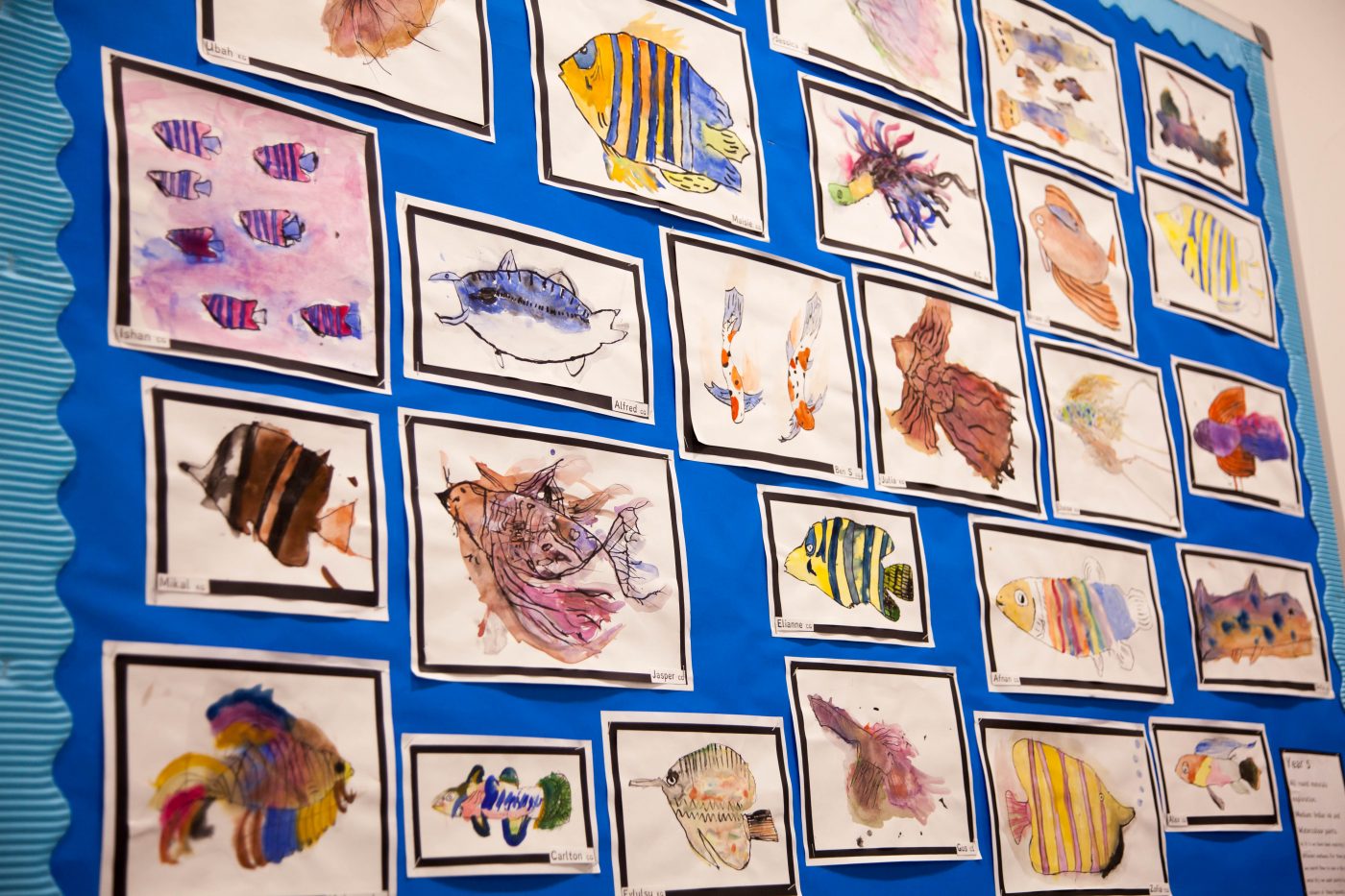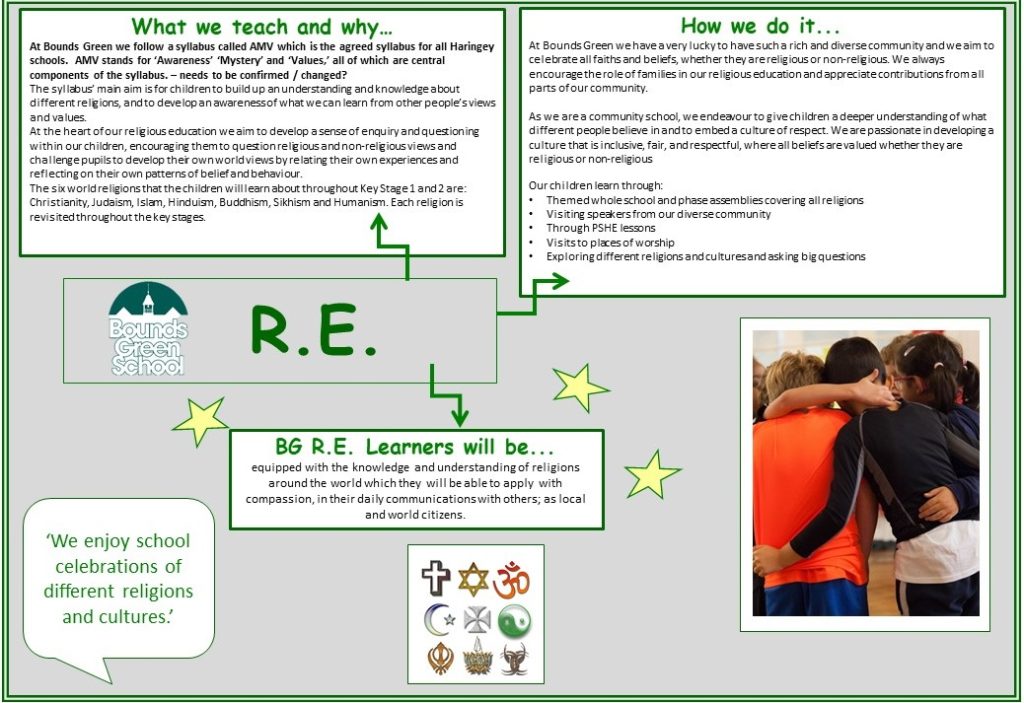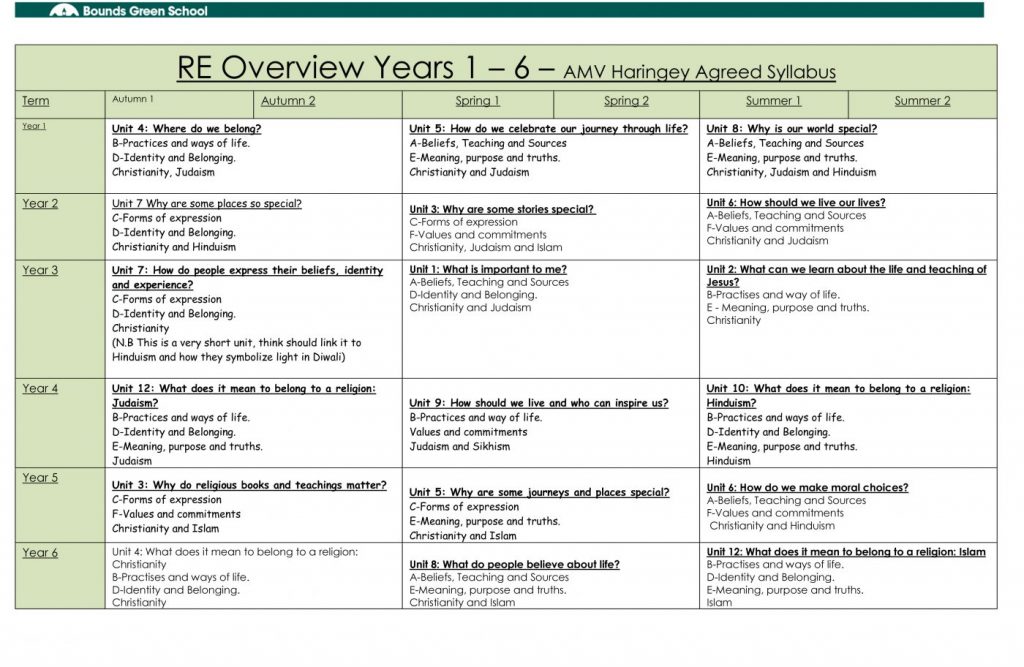Religious Education

Religious Education
Bounds Green is a happy and successful school community because:
· We NURTURE each unique child to value themselves and develop self-worth in order to thrive in life.
· We VALUE respect and responsibility, individuality and inclusivity, confidence and kindness.
· We CHALLENGE every child to be ambitious and achieve success in their learning.
RE Curriculum Detailed Overview..
Religious Education at our school offers opportunities for personal reflection and spiritual development. It enhances pupils’ awareness and understanding of religions and beliefs, teachings, practices and forms of expression, as well as of the influence of religion on individuals, families, communities and cultures. It permeates across all aspects of life.
Intent
At Bounds Green School, we have designed our R.E curriculum with the intent that our children will become resilient, accepting, mindful and inquisitive learners. We feel that Religious Education plays a significant role in developing children’s spiritual, moral, social and cultural development, hence, our curriculum promotes open mindedness and encourages children to be respectful and understanding citizens who are sensitive and aware of the beliefs of others. Our religious education curriculum allows children to discover and gain an insight into religions within the world that we live: Christianity, Judaism, Islam, Hinduism, Buddhism, Sikhism and Humanism while fostering appreciation for and understanding of other faith traditions. We want our children to explore, engage and reflect upon a wide range of religious beliefs and practices whilst contributing their own insightful thoughts. We see the teaching of RE as vital for children to understand others’ beliefs and make connections with their own values, the British Values and our School Vision. It is our role to ensure that our children are being inquisitive about the world around them by ensuring that high quality learning experiences are given.
We make no presumptions as to the religious backgrounds, beliefs, or values of our children. We value the religious background of all members of our school community and hope that this encourages every child to share their own experiences with others freely, in lessons and in assemblies. All religions and their communities are treated with respect and sensitivity and we value the links that can be made between home, school and the community. We are extremely lucky that our school reflects a diverse community and we hope to make stronger connections with members of local churches, temples, synagogues and mosques.
Implementation
At Bounds Green School, RE is taught through the Awareness Mystery Value agreed syllabus in years 1 – 6. This approach ensures that children explore themes and concepts within religion, drawing upon beliefs from a range of different faiths and world views. Succinct and purposeful links are made to other subject areas appropriately e.g. PSHE, and RSE.
Medium plans are available for each unit of work. Teachers adapt these plans to meet the needs of the children in their classes.
The EYFS curriculum supports children’s understanding of religious education through the planning and teaching of ‘Understanding the World’. Children are encouraged to use their imagination and curiosity to develop their appreciation of, and wonder for, the world in which they live. Exploring others views, cultures and beliefs supports children in developing their views and beliefs about themselves, their family and community. In finding out about others, young children are encouraged to reflect on beliefs, culture and practice and explore faith through observing festivals and celebrations, sharing stories, visuals, toys and puppets, handling real artefacts, roleplay, books and discussion.
In Key Stage 1, children are taught to: explore a range of religious stories and religious texts and discuss their meanings; explore a range of celebrations, teaching and traditions in religions, noting similarities and differences. They also begin to recognise how belonging to a religion is important to people; and reflect upon what matters to them and others who hold religious views; and the moral values of right and wrong.
In Key Stage 2, children are taught to: explore and comment on key aspects of religions, believers lives, their stories and traditions and their influence; explore how practices are related to beliefs and teachings; interpret information about religion and religious beliefs through a range of sources; recognise similarities and differences within and between religions; consider how religions and spiritual ideas are expressed; and describe and begin to encounter religious and other responses to ultimate questions and ethical or moral issues. Children within this phase are taught to reflect on what it means to belong to a faith community and how this relates to them and others’ lives as well as how to reflect upon morality and how people respond to decisions they are faced with.
Throughout each phase, there is a strong emphasis on developing and embedding the use of religious vocabulary when discussing and expressing knowledge, and this, coupled with interactive and practical activities, encourages our children to extend their understanding of difficult concepts, allowing them to confidently tackle challenging questions.
The children at our school enjoy learning about other religions and why people choose to follow a religion. Through their R.E. learning, the children make links between their own lives and those of others in their community and in the wider world. Our children are prepared to continue on their journey because they understand other people’s cultures and ways of life and worship, which they can communicate to the wider community.
Impact
By the end of KS2 children will:
- have a deeper knowledge and understanding of religions and beliefs.
- have the knowledge needed to reflect on questions, offering their own thoughtful and informed insights into religious and world-views.
- use a wide range of religious vocabulary and will be able interpret religious symbolism in a variety of forms.
- explore questions of beliefs and values in relation to a range of contemporary issues in an ever-changing society
- show high levels of self-awareness and demonstrate respect and empathy for others.
ASSESSMENT
On-going assessment is captured in discussion groups during lesson time and in short pieces of writing which will now be in separate RE/PSHE books (starting in Jan 2022).


